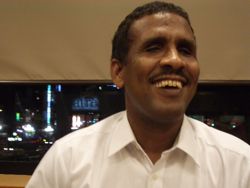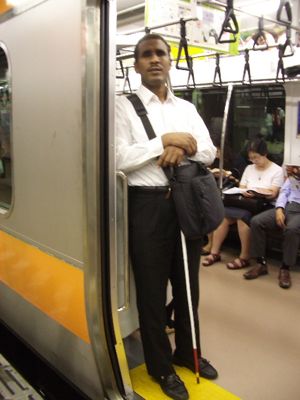July 20 (Tue), 2010
#36 Mohamed Bashir
Mutual fund employee
(He's been in Japan since 2000)

It may be no exaggeration to say that Japan is a country for visually-impaired people.
Interviewees whom we've talked to so far told us about their life in Tokyo or Japan through their eyes. But today we introduce you to a man who can have nothing meet his eyes.
His name is Mohamed Bashir from Sudan, a country in northeastern Africa. He smiles wonderfully at us but he lost his sight at age 11. He's not been able to see anything since then.
But Bashir looks very happy! While we heard his story, we wondered, "Is it truly sad for us to have no sight? We can see everything and many kinds of information come in, but it could be a cause of unhappiness."
Overcome odds - We often say something like this and this expression is used mainly among normal individuals. But to people with disabilities, odds wouldn't be odds at all... Every time Bashir laughed cheerfully, we thought like that.
Interview @ Yotsuya (Shinjuku-ku)
A nation for the visually impaired.
I wanted to go overseas originally but I'd never imagined that I would come to Japan. A Sudanese university professor who's been a great help to me used to study in Japan. He was a member of the "International Association For The Visually Impaired" (IAVI)" and I was chosen as a scholarship student of the association through his agency. That's the reason I came to Japan.
I think Japan is a very comfortable country for the visually impaired. We can study and get jobs here. Those are impossible things to do in Sudan. Also textured paving blocks for the visually impaired are installed in many places in Japan. On the other hand, we can't walk outside them unless constantly-attended.
We can use screen readers here in Japan. And train announcements guide us very well. There are many signals that play music while they are on green. So we can live without relying on healthy people. People are very kind to us, enough to take me to a place when I ask them for directions. Supermarket staff help me with shopping. It may be no exaggeration to say that Japan is a country for visually-impaired people.
I cannot understand suicide.
Japan is such a wonderful country for me, but I cannot understand one thing. That is there are many suicides in Japan.
I lost my sight when I was 11 but I didn't take it seriously because I was a little kid. But some of the visually impaired in their 20s or 30s are stuck in their homes. It's very hard for them to learn how to read braille or adjust themselves to the situation of not being able to see. On the other hand, children are adaptable to any kind of circumstances.
However I've never heard that the visually impaired ended their lives in suicide. If Japanese people in Japan who have no physical defect commit suicide, I can never understand them. Japan is a rich country, that's why I can't help wondering why many people commit suicide.
There are no suicides in Sudan even though people suffer from food shortage there. I discussed suicides with people after I came here but I could never understand the reasons why.
Voice is a lifeline.
Three or four months before coming here, I studied Japanese braille. But I couldn't understand what people said at all. I couldn't understand even easy Japanese phrases like "Could you open the door?"
If you are a normal person, you can communicate with foreigners by means of gestures. But we can never communicate with others unless we hear their voices because we cannot see anything. That was a big problem for me so I talked in easy Japanese words and some English.
Members of the association for visually impaired taught me the Japanese language, customs and culture for two and a half months. Then I entered the school for the visually impaired in Kyoto.
Despite going back home.
After entering Kyoto Prefectural School For The Visually Impaired, I couldn't follow the class at all for an entire trimester. They taught Japanese traditional massage and acupuncture in that school so I had to learn many technical terms. Of course they were Japanese so I got confused like which words were high-profile words and which ones were jargons.
So I had a tough time for about six months until the summer break in 2000. I'd been home for five weeks because a school-owned dormitory which I stayed closed during summer vacation.
I thought that I would never come to Japan again. But we couldn't study anything at all in Sudan and there were no job opportunities for us. Moreover the visually impaired-friendly environment was not created yet. That's why I came back here.
After starting the second trimester, I don't know why but I could understand the lectures at school gradually. And in the second year of the school, I could speak Japanese fluently. I think that's thanks to teachers in a dormitory and my roommates.
Going out in the financial business.
I studied at that school for four years and passed a national Japanese traditional massage exam. Then I worked at a clinic for two years. After that I entered a university in Kyoto. I had been in Kyoto until the end of 2009 so I'm new to Tokyo. I moved up here to enter a mutual fund company.
That company hires foreigners and people with disabilities willingly and I've been interested in investment trust funds. Actually I used to make my living by massaging, but it was more a labor of necessity than an interest. I was originally interested in finance.
When I went to a career fair for disabilities, I met a recruitment staff of the mutual fund company. And I was moved by their management principles, which preserve diversity in the financial world. I thought, "I will be able to make contributions to both people with disabilities and Africa. So I decided to join that company.
To be a pathfinder.
I'm in charge of data gathering for investment seminars given by my company. I gather information regarding Middle East and Africa and generate reports for company staff. If you don't know about the politics, social system, culture and natural resources of a certain country, you cannot do business with it.
Sometimes I take a leadership role in holding seminars regarding disabilities. I tell people about lifestyles of people with disabilities or their ways of working. There are not only people with disabilities but also healthy people so I would like them to know about the problems of persons with disabilities. On the other hand, I would like the disabilities to know about the mutual fund.
I think I'm the only visually-impaired person who works at a finance institution. It may be because the visually impaired assume, "I'm far from the finance or investment""I won't be able to work in that world".
Also I think it's because financial companies haven't made preparations well to hire the disabilities. Financial world in Japan has the lowest percentage of impaired employees among all types of industry. In fact, my company was the only one which participated a career fair for the disabilities which I attended.
When I went to university in Kyoto, I researched about handicapped persons' employment. Then I learned that few disabled persons work for finance institutions. Those were the reasons why I got interested in working in the financial industry.
I would like to encourage the visually impaired to understand investment or finance more.
Going online makes our lives easy?
For example, a screen reader is an indispensable tool for us. But I cannot use mine under Windows 2007 yet. If we buy a new one every time Windows is upgraded, it'll cost an arm and a leg for us.
Also if touch-screen devices replace conventional computers completely, we can't do anything. Because a keyboard is the most essential tool for us when we use computers. We do everything by keyboard operation even when we move the cursor around.
But as long as we update screen readers, it is preferable for us to go online. Because screen readers read stories out loud. We cannot read newspapers but we can read news articles that are published on the internet thanks to screen readers.
And I believe that big computer manufacturers will develop smart phones or tablet computers for the visually impaired. So I don't feel negative at all.

What is Japan to you?
It's "the land of dreams" to me!
Now I'm really happy to be here. Yes, 100%!

 Previous
Previous